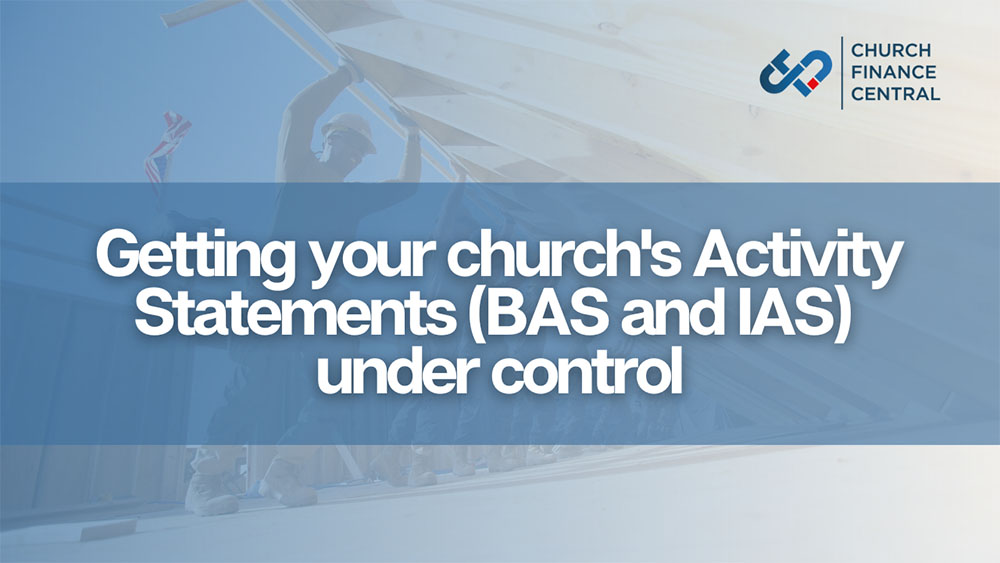
Lodging your Business Activity Statement (BAS) and/or Instalment Activity Statement) (IAS) is an important aspect of your church compliance. If your BAS/IAS is lodged late you can incur significant penalties and interest which can, in turn, affect your church budget.
And if you have inaccurate lodgements, this can make the whole process more time consuming as you try to rectify past mistakes by preparing and lodging amendments.
Setup and Configuration
In order to get started on your BAS processing, there are a few broad areas that you’ll want to consider.
The first consideration is your GST registration status with the ATO – in terms of:
- the basis of your GST reporting (whether on a Cash or Accrual basis)
- the start/end date of your GST registration
- your GST reporting period/frequency
- any GST concession you may be entitled to
Once this is clarified, you’ll then want to configure your accounting system to match these settings. You’ll also be able to set default GST codes in your accounting system for general ledger accounts and/or suppliers which can help your data entry-process.
Another important area to consider is what the receipting policy for your church is going to be. There are certain minimums of documentation that the ATO may require, so these should be built in. But you may also have additional local requirements as to what level of documentation you require your team to keep and submit in relation to expenses and GST.
Complex GST Scenarios
You may have already experienced that your church has a number of GST scenarios that are unusual and not as familiar as what you’ve seen in general business situations.
In these cases, it can be helpful to document the scenarios and the specific way GST is to be handled. It may also be further helpful to seek specific advice from the ATO or your denominational head office when GST gets complex.
Some of the scenarios that you may want to keep an eye out for could include:
- Residential rent
- Commercial rent
- Weddings, funerals and occasional services
- Meals and entertainment items
- International items
- Fundraising and ministry activities
- Transactions within a GST group
- Various types of insurance and stamp duty
- Bequests, legacies and grants
- Land purchases and sales
- Motor vehicle purchases and sales
- Church events and retreats
- Cemeteries and columbaria
- Ministers housing and benefits
It’s important also to consider that if any of these situations involve your church issuing tax invoices to other people or entities, there are certain minimum requirements that must be included on these tax invoices. Often this can simply be configured into the invoice templates in your accounting package, so that you can issue compliant invoice directly from that source.
Preparation and Lodgement
When it comes time to lodge your BAS, the following steps may be good to include in your procedure:
- review your system’s GST set up – that it’s up to date
- review reconciliation reports to ensure all data has been recorded
- review your GST transactional audit report
- review your PAYG figures for the period
- prepare your BAS/IAS
- collect the appropriate authorisation or sign-off
- lodging your BAS with the Australian Tax Office (ATO) (electronically or paper-based)
You may also like to consider:
- Locking the period in your accounting system when lodging the BAS, in order to avoid changes being made after lodgement
- Having a documented method for recording the various component of your BAS lodgement (GST, PAYG, ATO Client Account) into your accounting system
- Reconciling the ATO transactions within your accounting system with the live ATO records
- Doing a regular check to see if there have been historical coding changes made that may require a GST adjustment or BAS resubmission.
An important note – if you are paying someone external (i.e., not a church employee) to prepare and lodge your BAS for you, it’s important this this is a registered BAS Agent. Individuals or companies providing BAS services for a fee are required to meet certain standards and be registered with the Tax Practitioners Board.
Would you like to explore further topics related to church bookkeeping, church payroll and church financial management? eBook available now:
Your Handy Overview of Church Financial Management
(including your 80+ point Church Financial Management Overview Checklist)
This guide aims to provide a useful and helpful big-picture view – to assist you in further developing the financial function of your church in your context. Designed for church pastors, church ministry leaders, church officeholders, church admin teams, church treasurers and church members.
Request your free eBook here
